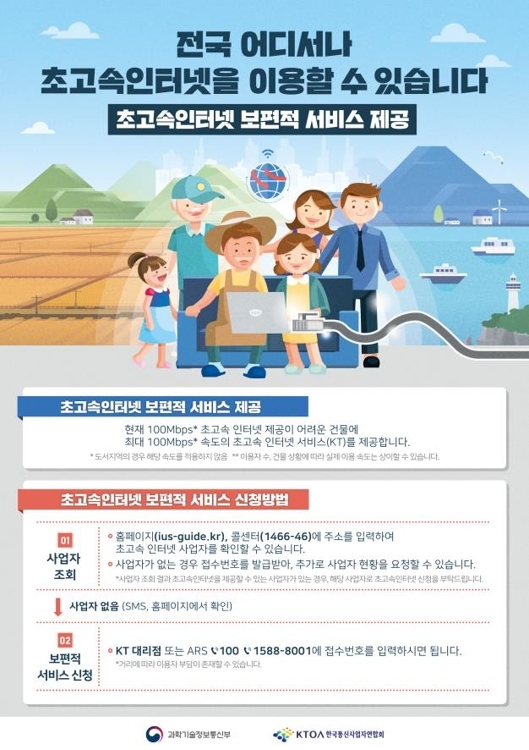South Korea has started offering super high-speed internet service for the entire country that will allow universal, convenient access to online data, the government said Sunday.
"High-speed internet has been designated as a universal service that everyone is entitled to receive no matter where they are," the Ministry of Science and ICT said. The ministry said KT Corp., the country's top fixed-line operator has been tasked with providing the infrastructure in places that have not benefited from coverage in the past.
The move makes the country the eighth in the world to offer universal high-speed internet to all citizens, but the transmission speed of 100 mega bit per second (100 Mbps) is the fastest by far, the ministry said. The United States, Spain, Switzerland, Finland, Malta, Croatia and Sweden have all introduced universal service, although the average speed offered stands at 10 Mbps for the US with many others getting access speeds of just 1-2 Mbps.
 |
(Yonhap) |
Asia's fourth-largest economy ranks No. 1 among Organization for Economic Cooperation and Development members in terms of fiber optic cable internet connectivity penetration, yet it only started deliberating on the need to provide universal coverage in 2016. The country does suffer from so-called dead zones, where there are no or restricted services, with rural and fishing communities, as well as isolated homes in mountainous regions, not getting support.
South Korea also has some 880,000 older buildings that do not have the necessary high-speed internet infrastructure.
Hong Jin-bae, the director general of the office of network and telecommunication policy at the ministry, said the latest move will address the internet dead spots issue, and effectively end the "data divide" that existed between people with availability to the latest internet infrastructure and those without.
He added that universal service will help the country push forward its ongoing effort to fully take advantage of the fourth industrial revolution that is anchored to connectivity access. (Yonhap)




![[Herald Interview] 'Trump will use tariffs as first line of defense for American manufacturing'](http://res.heraldm.com/phpwas/restmb_idxmake.php?idx=644&simg=/content/image/2024/11/26/20241126050017_0.jpg)

![[Health and care] Getting cancer young: Why cancer isn’t just an older person’s battle](http://res.heraldm.com/phpwas/restmb_idxmake.php?idx=644&simg=/content/image/2024/11/26/20241126050043_0.jpg)

